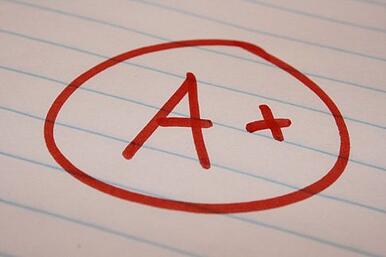
Sure, they can help you get college credit and make your transcript more impressive. But are AP tests hard?
The answer isn't an easy yes or no. You need to consider many factors, including your own academic strengths, your school, and national score statistics. We'll guide you through these different factors and help you decide for yourself how hard AP tests will be!
The AP Test Versus the AP Class
There are two factors to consider when deciding how hard an AP subject is: the difficulty of the AP exam itself, and how the AP class is taught at your high school. Your score on the exam will affect whether you can get college credit for the class. Your grade in the class will affect your GPA and overall transcript impressiveness.
For example, if you're wondering, "Is AP Biology hard?", the answer depends on a few factors. AP Biology could be a very tough course at one high school but an easy A at another, depending on the teacher and curriculum.
The exams, however, are pretty similar year to year. Some are harder than others, though your experience will depend on your personal strengths.
In general, all AP classes are challenging and the exams are difficult, since they're meant to be at the same level of an introductory college class. That said, we'll explore some factors that could make an AP class and test harder or easier.

How Hard Is It to Pass an AP Exam?
Earning a passing score (3+) on the AP test proves that you mastered the material and are able to study for a college-style cumulative exam. Doing well on the AP exam can help you get college credit and give your college applications a boost.
It's important to think about how hard an AP exam might be for you before signing up for the class. The average passing rate is around 65%, so your odds of passing an AP exam are generally good. However, just because the odds are in your favor, that doesn't mean you can slack off—far from it, in fact!
The odds of passing with a 5—the highest score—are quite low on any exam: between 10% and 20% for most tests. They are even lower for popular tests, such as AP English Lit and AP Environmental Science, which have 5 rates below 10%. This is likely because a wider pool of exam takers results in more less-prepared students taking the test.
Check out the table below to see the 2022 passing rates for all AP exams:
|
Exam Name
|
Passing Rate (3+)
|
5 Rate
|
|
Art and Design: Drawing
|
88%
|
15%
|
|
Chinese Language and Culture (Total Group)
|
87%
|
49%
|
|
Art and Design: 2-D Design
|
87%
|
11%
|
|
Seminar
|
83%
|
12%
|
|
Research
|
83%
|
13%
|
|
Spanish Language and Culture (Total Group)
|
82%
|
24%
|
|
Spanish Language and Culture (Standard Group)
|
78%
|
16%
|
|
English Literature and Composition
|
78%
|
17%
|
|
Calculus BC
|
77%
|
41%
|
|
Japanese Language and Culture (Total Group)
|
75%
|
49%
|
|
Art and Design: 3-D Design
|
74%
|
6%
|
|
Physics C: Mechanics
|
73%
|
26%
|
|
French Language and Culture (Total Group)
|
72%
|
13%
|
|
Italian Language and Culture (Total Group)
|
71%
|
23%
|
|
Gov. and Politics - Comparative
|
71%
|
16%
|
|
Physics 2
|
70%
|
16%
|
|
Physics C: Electricity & Magnetism
|
69%
|
32%
|
|
French Language and Culture (Standard Group)
|
69%
|
8%
|
|
Computer Science A
|
68%
|
27%
|
|
Biology
|
68%
|
15%
|
|
Italian Language and Culture (Standard Group)
|
66%
|
11%
|
|
German Language and Culture (Total Group)
|
66%
|
20%
|
|
Chinese Language and Culture (Standard Group)
|
65%
|
16%
|
|
Computer Science Principles
|
64%
|
11%
|
|
Spanish Literature
|
64%
|
8%
|
|
Music Theory
|
62%
|
19%
|
|
Art History
|
62%
|
14%
|
|
World History
|
62%
|
13%
|
|
Statistics
|
61%
|
15%
|
|
Microeconomics
|
59%
|
18%
|
|
European History
|
59%
|
14%
|
|
German Language and Culture (Standard Group)
|
58%
|
8%
|
|
Psychology
|
58%
|
17%
|
|
Latin
|
57%
|
11%
|
|
English Language and Composition
|
56%
|
10%
|
|
Calculus AB
|
56%
|
20%
|
|
Japanese Language and Culture (Standard Group)
|
54%
|
16%
|
|
Chemistry
|
54%
|
13%
|
|
Environmental Science
|
54%
|
9%
|
|
Human Geography
|
53%
|
15%
|
|
Macroeconomics
|
52%
|
16%
|
|
Gov. and Politics - United States
|
49%
|
12%
|
|
United States History
|
48%
|
11%
|
|
Physics 1
|
43%
|
8%
|
Source: College Board. For language rates, "Total" includes all students, while "Standard" includes only those students who didn't indicate they speak this language at home or spent more than four weeks studying it abroad.
Note that a lot of AP classes self-select for motivated students or students with experience in a subject—especially the ones with very high pass rates, such as Chinese, Calculus BC, and Spanish. Even though these exams have high pass rates, they're often viewed as some of the hardest AP classes to pass.
Also, notice that exams with some of the lowest passing rates, such as Environmental Science and Human Geography, are ones many students say are the easiest. These exams have lower passing rates because younger high school students who are less prepared for AP tests often take these classes. In addition, many students simply underestimate them and don't study enough. As a result, these exams can be easier to pass, but you have to be prepared to study and not expect to pass without some hard work.
If you are studying for a test with a particularly low pass or 5 rate, be sure to do plenty of multiple-choice and free-response practice so you can get that top score. Also, consult our scoring guide to learn how to come up with a target raw score while practicing.
Furthermore, instead of just going off the pass rate table only, think about the subjects you've traditionally been strong at—these will likely be easier APs for you to pass.
On the other hand, if there is a subject you've always struggled with, the AP exam in it will likely be hard for you, even if it seems as though a lot of students are able to pass it every year.
How Hard Are AP Classes?
So what about the classes themselves? Is AP Chemistry hard? Is AP Psychology hard? How about Statistics or English?
How hard an AP class itself will be for you is important to consider. In general, a B in an AP class is more impressive than an A in a regular course. However, if your GPA is getting dragged down by a bunch of AP classes, that's not the best outcome either.
After all, your GPA is very important in college admissions and is used to calculate your chance at getting scholarships, too. Therefore, you want to make sure that you challenge yourself but don't spread yourself too thin.

Of course, getting an A in an AP class is ideal.
The difficulty of an AP class will depend on your school and its grading policy (some schools weigh AP classes so getting lower than an A won't necessarily drop your GPA below a 4.0).
AP class difficulty also varies a lot from teacher to teacher. Some teachers won't assign a lot of work but will expect you to study on your own. Others will keep you busy with nightly assignments, practice tests, and projects.
As an example, I took both World History and US History AP courses in high school. Both AP tests are considered difficult: you have to learn a ton of material and also be able to write quality free-response answers in a short amount of time.
However, even though the tests were similarly hard, these two AP history classes were taught very differently at my school. For AP World History, we were given reading assignments out of the textbook and unit tests, but there were not many daily assignments or projects. Basically, we were expected to keep up with the material on our own, and, as a result, I had to independently handle much of my own studying for the test.
For US History, we had textbook readings, outlines, vocabulary lists, and research projects. Our teacher also held many after-school and Saturday study sessions. The class itself kept me very busy, but the assignments were important practice for the AP test, and so there was less I had to do on my own.
World History was fairly easy to get an A in but a tough test to pass. By contrast, US History was tough to get an A in and a tough test to pass.
There is no right way to teach an AP class. But as a student, you should be aware of your strengths and limitations. Do you do better directing your own studying, or is it helpful for you to have daily assignments to force you to stay on top of things? Being able to answer this question will help you choose AP classes that play to your strengths, and also let you get good grades and pass the exam.
In general, there is a lot of material to cover in AP classes, so they tend to be more challenging than regular classes—especially courses like AP Calculus, AP Biology, AP Physics, US and World History, and English. These are all much harder than their regular or honors equivalents.
Some exceptions are AP US Government, which some schools cover in a semester because there is less material, and AP Environmental Science, which has less memorization than AP Biology and AP Chemistry do.
Still, how hard any one AP class will be ultimately depends on your school and the teacher. Find out about the teacher and curriculum of an AP class before signing up to make sure it's a good fit for you and your study style. (See our post on which AP class you should take to learn more about scoping out classes.)

How to Decide Whether an AP Class Is Too Hard for You
It's often difficult to determine whether an AP class will be too difficult for you. Here are some tips to lend you a hand for both before and after you sign up for an AP class.
Before You Sign Up for an AP Class ...
#1: Think About the Classes You've Already Taken
For example, in order to take AP Biology, most schools require students to take regular or honors biology first. The more background knowledge you have of a certain subject, the more likely you'll do well in its corresponding AP class.
If you don't have a ton of prerequisites for an AP class, think carefully about whether the class will be out of your reach. It'd be very tough to take on, say, AP Physics, if you've never taken a physics course before!
#2: Can You Find a Copy of the AP Syllabus?
Looking at the AP class's current syllabus can help you find out what the workload is like and how the teacher integrates practice AP exams into the course. You can also talk to current students and ask about their experiences in the class.
#3: Find Out the Passing Rate for the AP Test at Your School
If the passing rate for the AP test is low, recognize that you might have to put in a lot of work on your own in order to pass it. If it's a high pass rate, though, that's a good sign that the teacher has a strong AP-prep curriculum in place.
#4: See Whether There's a Summer Assignment
Many AP classes kick off with work over the summer. If you already have summer plans that will make it hard to complete the work, think carefully about whether you can fit that class into your schedule.

Past you may owe present you an apology for taking on a tough AP class.
After You Sign Up for an AP Class ...
#1: Evaluate How Things Are Going at Your First Midterm
What's your grade so far in the class? How are you doing with the teacher's style? How well are you getting the material? Consider dropping to the regular class if you are seriously struggling, but try to push through the first marking period. Just make sure that you don't pass your school's class- change deadline!
#2: Reevaluate at the End of the First Term
If, by the end of the first quarter/trimester, your grade hasn't improved or you don't think you are understanding the material, seriously consider dropping to the regular version of the course. It's not worth taking the AP exam if you're certain you won't pass—and it's definitely not worth damaging your GPA over an AP test you won't pass!
#3: Before Dropping, Explore Extra Resources
Don't just drop an AP class right away; rather, try to explore other resources available to you, such as in-school tutoring, private tutoring, online resources, and study groups.
If meeting with a study group once a week or doing your own online practice problems helps you keep up with an AP class, then consider pushing through.
However, if you try adding an outside resource and are still seriously struggling to understand the material and make it through the class, it's better to just drop to regular and focus your efforts on other advanced classes.
What's Next?
Read our guides to learn more about AP tests, such as how long they are and how can you deal with exhaustion. Also, learn about how AP tests are scored. The first step to getting a 5 is finding out the minimum raw score you need to earn one!
Have you taken the ACT or SAT yet? Not sure which one you'll do best on? Read our guide to choose the test that's right for you.
If you've taken the SAT and want to improve your score, check out our guides to improving your Reading, Writing, and Math scores.
Taking the ACT instead? Learn the vocabulary you need to know, all the most important grammar rules, and how to write an ACT essay.
Have friends who also need help with test prep? Share this article!

Halle Edwards graduated from Stanford University with honors. In high school, she earned 99th percentile ACT scores as well as 99th percentile scores on SAT subject tests. She also took nine AP classes, earning a perfect score of 5 on seven AP tests. As a graduate of a large public high school who tackled the college admission process largely on her own, she is passionate about helping high school students from different backgrounds get the knowledge they need to be successful in the college admissions process.



































 Holly R.
Holly R.